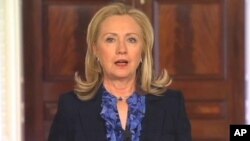The United States is relaxing some long-standing sanctions on Burma in hopes of encouraging further reforms after landmark elections Sunday in the Southeast Asian nation.
Secretary of State Hillary Clinton said Wednesday that Washington will soon nominate an ambassador to Burma. It will also establish an in-country U.S. Agency for International Development mission to support efforts by the United Nations Development Program.
In other steps, Washington will enable U.S. private relief groups to carry out development activities in Burma. Select Burmese officials and members of parliament will be allowed to travel to the United States. Washington will also ease restrictions on U.S. financial and investment services to help accelerate economic modernization and political reform.
Still much to be done
But Clinton warns that Burma's reform process still "has a long way to go," and that the country's future is "neither clear nor certain." She said the United States will continue easing sanctions as long as the Burmese government continues making reforms.
"We will continue to monitor developments closely and meet, as I said when I was there, action with action," she said. "We will continue to seek improvements in human rights including the unconditional release of all remaining political prisoners and the lifting of conditions on all those who have been released. We will continue our support for the development of a vibrant civil society, which we think will greatly add to the reform of the economy and the society."
On Burma's decades-long conflict with various ethnic minority groups, Clinton said the U.S. will continue calling for national reconciliation. One of those groups, the Karen National Union, said Thursday they have re-opened talks with the government aimed at ending the world's longest running armed conflict.
Burma's leading opposition party won more than 40 parliament seats in by-elections Sunday and its leader, Aung San Suu Kyi, was elected to parliament after spending most of the past 20 years in detention.
Senator McCain's reaction
On Wednesday, U.S. Senator John McCain, who backed sanctions against Burma's former military government, told VOA the elections were "generally fair," despite numerous reports of voting irregularities. He also said the elections represent an important step in Burma's path toward democracy.
"I think there were significant problems with the election, many of which were pointed out by the party of Aung San Suu Kyi. And it could have been better. But it was a dramatic improvement from what were totally corrupt elections in the past," said McCain.
McCain said lawmakers will consider a further loosening of sanctions when Congress returns from its recess in May.




